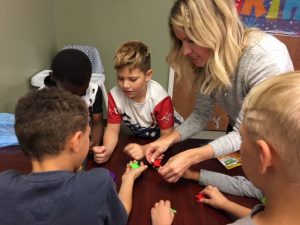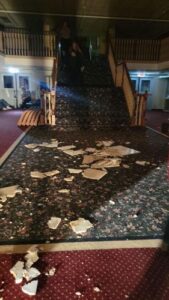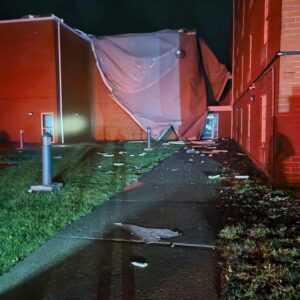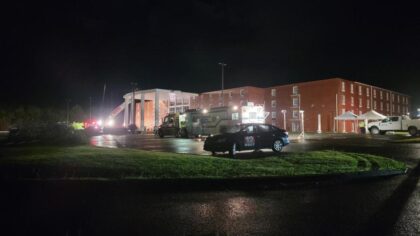Donate to Laundry of Love!
Comments Off on Donate to Laundry of Love!We need your help! Bartlett Housing Solutions is introducing our “Laundry of Love” Campaign, where we aim to raise $10,000 for a crucial upgrade that will not only enhance our in-house services but also save the organization a remarkable $16,000 annually.
Our goal is clear – we aspire to acquire a state-of-the-art commercial washer and dryer, coupled with fresh, medical-grade bed linens.
By contributing to our campaign, you’re directly supporting an initiative that will have a lasting impact on Bartlett Housing Solutions. These new items, will not only elevate the living conditions for those we serve but also result in significant cost savings, allowing us to redirect funds towards other critical programs.
Bartlett Housing Solutions Announces Release of Annual Report, Highlighting Accomplishments and Evolving Policies
Comments Off on Bartlett Housing Solutions Announces Release of Annual Report, Highlighting Accomplishments and Evolving PoliciesMorgantown, WV October 9, 2023 – Bartlett Housing Solutions, a leading provider of housing solutions in the community, is pleased to announce the release of its Annual Report for the time period of July 1, 2022, to June 30, 2023. The report showcases the organization’s commitment to addressing the housing needs of the community and reflects its ongoing efforts to adapt to the evolving needs of those it serves.
One of the key highlights of the Annual Report is the significant increase in housing placements across all programs. Bartle3 Housing Solutions has successfully placed a record number of individuals and families into safe and stable housing during the reporting period. This achievement is a testament to the organization’s dedication to providing effective housing solutions and support services to those experiencing homelessness or housing insecurity.
In addition to the positive outcomes in housing placement, Bartlett Housing Solutions has also implemented new policies and procedures to be3er reflect the evolving needs of the community. Recognizing the changing landscape of housing challenges, the organization has proactively adapted its approach to ensure that its programs and services remain responsive and effective. These new policies and procedures aim to enhance the overall quality and accessibility of housing solutions, ultimately improving the lives of those in need.
“We are proud to share the outcomes of our Annual Report, which demonstrate our continued commitment to addressing the housing crisis in our community,” said Keri Demasi, CEO at Bartlett Housing Solutions. “The increase in housing placements and the implementation of new policies and procedures reflect our dedication to providing comprehensive and sustainable solutions to those in need. We remain steadfast in our mission to create a community where everyone has access to safe and stable housing.”
Bartlett Housing Solutions invites community members, stakeholders, and the media to review the full Annual Report, which will be available here on our website. For further information or to schedule an interview, please contact Keri DeMasi at KDeMasi@BartlettHousingSolutions.org or (304) 282-4611.
About Bartlett Housing Solutions:
Bartlett Housing Solutions is a leading provider of housing solutions in the community. With a mission to address homelessness and housing insecurity, the organization offers a range of programs and services aimed at providing safe and stable housing options, as well as support services to help individuals and families regain independence. Bartlett Housing Solutions is committed to creating a community where everyone has access to affordable and sustainable housing.
###
Media Contact:
Keri DeMasi
Executive Director
kdemasi@bartletthousingsolu7b94aaons.org
304-282-4611
Intoducing our Newest Team Member, Randall Brown
Comments Off on Intoducing our Newest Team Member, Randall BrownBartlett Housing Solutions is excited to introduce our newest team member: Randall Brown!
Randall will be joining our Case Management Team as the Permanent Supportive Housing (PSH) Lead. He will be working in our PSH program which houses 16 chronically homeless individuals with an underlying disability (substance abuse disorder, mental illness etc.)
Additionally, Randall will be implementing his Addictive Behavior Awareness (ABA) class that he personally developed and copyrighted over 23 years of working with those suffering with substance abuse disorder. The class will be held 2 times per week for each program and will aim to support those suffering with addiction to find a road to recovery. Randall has decades of experience in this field and currently serves as West Virginia’s longest serving peer recovery coach.
Addiction has become a crisis nationwide and in our community. Bartlett Housing Solutions is dedicated to helping those battling this disease acquire necessary treatment and/or support and feel confident Randall and his ABA program will be pivotal in eliciting positive change amongst our clients battling with substance abuse disorder.
$9.7 Million to Support Affordable Housing in West Virginia
Comments Off on $9.7 Million to Support Affordable Housing in West VirginiaBartlett Housing Solutions in Morgantown, West Virginia was one of more than a dozen housing agencies across the state to be awarded money from the U.S. Department of Housing. Read more about the funding and its purpose here at The Dominion Post.
We Need Your Help: Triage Shelter Closed Due To Significant Damage
Comments Off on We Need Your Help: Triage Shelter Closed Due To Significant DamageThis past week, Bartlett Housing Solutions suffered a huge setback as our Triage Shelter was hit by a severe storm microburst and now has extensive damage to the roof and facility. Last year, we relocated our Triage Shelter to Hazel’s House of Hope, previously the Ramada Inn, to better serve our homeless community. The triage shelter provides support and services to some of our most vulnerable individuals facing homelessness, and serves as their first step towards help, assistance and recovery. We are extremely grateful that no one was physically injured during the storm.
To read more on the storm and damage, please visit the following media links:
- Tornado-like ‘microburst storm’ leads to roof of Bartlett House homeless shelter being nearly torn off – WV News
- Damage assessments underway following damaging storms in Mon County – MetroNews
- Morgantown: social service hub loses roof in storm – WDTV
Our entire Bartlett team is working diligently to continue to support our clients to the best of our ability. However, at this time, our Triage Shelter will be closed until further notice. Our existing clients will continue to be served through our facility located on West Run Road.
But now we need your help! The damage has forced us to find additional means and resources for serving our homeless community, which is currently averaging $1,000/night to house those displaced by the storm. We are determined to continue our mission of taking care of our residents, but only have limited resources.
We are asking for donations to help us continue to serve and assist our homeless community, who are already facing a number of challenges and obstacles. We ask you to please give what you can, share our request with anyone you know who might be able to help, either through direct giving or sharing on social media.
We are so grateful for any way you can help.
*****
From all of us at Bartlett Housing Solutions, we would like to extend our sincere appreciation to all of the first responders who arrived at the shelter to provide assistance including our firefighters, paramedics and police officers. We would also like to extend our appreciation to the Monongalia County Board of Education for providing a bus to assist in transporting our residents to our temporary housing, as well as The Salvation Army and Community Kitchen for their ongoing assistance in preparing hot meals that we can deliver to our clients. We would also like to share our appreciation for Morgantown’s Deputy Mayor Danielle Trumble and Tom Bloom for their immediate response and assistance.
We would also like to acknowledge and say thank you to Community Kitchen, Pantry Plus More, The Salvation Army and numerous community members for preparing hot meals, donating food and supplies for our clients that were displaced from our Triage Shelter.
Our team has been working non-stop to help deliver all of the items to our clients, who appreciate the generosity more than we can describe. We cannot thank our community enough for those that have stepped up to help in so many ways.
New Triage Center Now Open at Scott Avenue Location
Comments Off on New Triage Center Now Open at Scott Avenue LocationBartlett Housing Solutions triage center is now open at the old Ramada Inn location in Morgantown. Substantial roof damage at the previous location downtown made it impossible to stay there, and since mid-march, the triage center has been open 24 hours a day at their new location on Scott Avenue.
Bartlett occupies the 2nd, 3rd and 4th floors of the north wing of the building, with over 14,000 square feet of space and 28 beds in the triage center.
Keri DeMasi, Executive Director of Bartlett Housing Solutions, taked to WBOY about the changes.
It’s a brand new property that allows us to have a little more capacity in our shelter. But it also affords us the ability to offer additional rental housing units, which we have on the upper floors, the third and fourth floors of that property.
If you’re an individual in need of housing, call Bartlett Housing Solutions coordinated entry intake at (833) 722-2014. If you’re an individual with children and have nowhere to stay tonight, call our client services coordinator at (304) 292-0101.
Support our 2020 Canned Vegetable Drive!
Comments Off on Support our 2020 Canned Vegetable Drive!This November, we ask that you join us in a month of thankfulness & giving. With the winter months upon us, we ask for your help in stocking our pantry with canned veggies. On average, our team prepares 25 cans of vegetables per day, 7 days per week, resulting in a need for at least 700 cans each month. Any help or support is greatly appreciated, and reinforces our mission to provide an end to homelessness, even if that means one person at a time.
Given everything else going on around us, we’ve made it easier than ever to donate, or even to start your own fundraising drive!
Visit our Canned Vegetable Drive page here, and click “Start a Fundraiser” in the panel on the right. Then you can set your own fundraising goal, and get a custom page to share on your social media and with your family and friends.
If you’d prefer, you can donate directly from the Canned Vegetable Drive page, or you can drop off your donation in person at any of these participating locations:
- Compass Realty. 4000 Coombs Farm Drive, Suite 202. Morgantown, WV 26508. Directions here.
- Morgantown Power Sports. 526 Mileground Rd, Morgantown, WV 26505. Directions here.
- Stick Tattoo Company. 408 Suncrest Towne Centre Drive, Morgantown, WV 26505. Directions here.
Thank you so much!
Press Release: Policy and Procedural Changes to Maintain a Safe, Diverse, Inclusive and Welcoming Environment
Comments Off on Press Release: Policy and Procedural Changes to Maintain a Safe, Diverse, Inclusive and Welcoming EnvironmentBartlett Housing Solutions today introduces several policy and procedural changes to positively impact the operations of the organization. The Executive Director and Board of Directors of Bartlett House, Inc., are committed to maintaining a safe, diverse, inclusive and welcoming environment in which all individuals are treated with respect and dignity. We remain steadfast in our belief that no form of discrimination, harassment, or inappropriate conduct is tolerated by anyone in our facilities. Accordingly, to continue to encourage all individuals who utilize our services and facilities to report any discrimination, harassment, and other misconduct that they may experience or witness as well as emphasize that retaliation for making such a complaint is prohibited, we are updating our existing Client Grievance Policy and Procedure in the following ways:
- Implement a hotline that will allow an individual who is not comfortable with making a complaint to the individuals identified in the current Client Grievance Policy and procedure to submit an anonymous complaint which will be forwarded to the Executive Director for investigation. The anonymous hotline will be operated by a third party, staffed 24/7 and can be reached by phone or via internet. The Board of Directors will also receive a report, at least monthly, from the anonymous hotline outlining complaint data.
- Afford the Executive Director the discretion to forward complaints of discrimination, harassment or other inappropriate conduct to an independent third party to conduct the investigation and provide a report of factual findings to the Executive Director. Should a complaint involve alleged conduct by the Executive Director, the Board of Directors will forward the complaint to an independent third party to be investigated and the report of factual findings by the investigator will be provided to the Board of Directors.
- Include additional language in our Client Grievance Policy & Procedure to emphasize our position that if a complaint is made, retaliation is strictly prohibited, and any employee investigated and found to be engaging in retaliation would be subject to disciplinary action up to and including termination.
Also, in addition to our existing in-house training, all Bartlett House staff and volunteers will receive additional training provided by an independent third party concerning dual relationships, discrimination, harassment, other misconduct, and retaliation which will include a review of our Code of Conduct and other applicable policies prohibiting the same. The Executive Director and the Board of Directors will also receive training by an independent third party on conducting employee investigations with respect to discrimination, harassment, and other misconduct.
We are taking these steps to continue to ensure that all people experiencing homelessness have a safe and accessible shelter available to them as well as continue to provide mechanism through which they are comfortable to report any discrimination, harassment or other inappropriate conduct so that it can be investigated and addressed, if needed.
Volunteer Spotlight: Sigma Phi Delta!
Comments Off on Volunteer Spotlight: Sigma Phi Delta!Alan Brockman, Sigma Phi Delta, President says, “It is an honor to be recognized by Bartlett Housing Solutions! Sigma Phi Delta has been volunteering with Bartlett for several years, starting Downtown (when you were still called Bartlett House) and recently moving to the West Run location. Through Bartlett, our Brothers have had the opportunity to give back to the community and create meaningful experiences.”
The Sigma Phi Delta Fraternity has, since its founding on April 11, 1924 at the University of Southern California, has been a Professional-Social Fraternity of Engineers. We are Professional in that, unlike the General Fraternity, we admit to membership only students enrolled or working in a curriculum, or program, leading toward a degree in engineering; and that we encourage our members to give the fullest support to the faculty of the Colleges and Schools of Engineering throughout North America. Each week we are at Bartlett Housing Solutions, and we find ourselves helping Rick Green, the Facilities Manager in many ways; serving food, cleaning facilities, doing yard work, organizing supplies, and even renovating units for their next resident.
As an organization, we are striving to set an expectation for our younger members to continually give back to their community. We appreciate the continued flexibility and opportunity that Bartlett House provides to us every year!”
New Initiatives for Women and Children
Comments Off on New Initiatives for Women and ChildrenBartlett Housing is so grateful to be the recipients of component funds of Your Community Foundation of North Central West Virginia, Inc. (YCF) from The Women’s Giving Circle of North Central West Virginia (WGC). Awards are presented annually to several local charitable organizations, and this year we were fortunate enough to receive funding!
WGC funds will provide the opportunity for women who have been financially abused to gain the skills they need to get back on their feet and move toward a more prosperous future. Class are being held weekly for our residents and are specially tailored to the needs of each resident.
Bartlett also received funds from a private, local foundation to support our anti-bullying program and monthly children’s birthday parties. Weekly classes help kids, and their parent learns how to identify and prevent bullying. Additional funds from this private foundation support The Bartlett Birthday Project, a monthly event designed to ensure all of our children have a great birthday. The Bartlett Birthday Project is the brain-child of Hannah Trickett (pictured right with party goer’s), a local community member dedicated to making sure that all of our children have cupcakes, gifts, games, and FUN on their special day. If you would like to help Hannah and our kids have a memorable birthday, please contact Hannah on Facebook at https://www.facebook.com/hannah.chamberstrickett.





